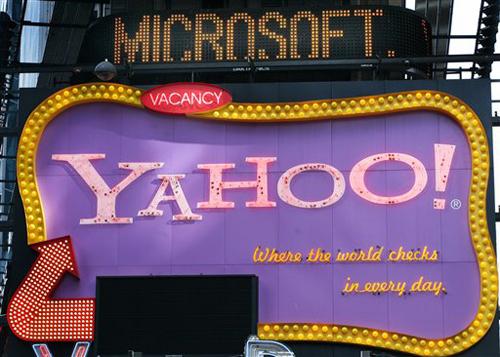Microsoft makes unexpected $44.6B bid for Yahoo; Internet icon is studying it

A Times Square news ticker flashes a headline about Microsoft above a billboard for Yahoo! in New York in this Friday, May 4, 2007 file photo. Microsoft Corp. has pounced on slumping Internet icon Yahoo Inc. on Friday, Feb. 1, 2008, with an unsolicited ta Pamela Nisivaco
Feb 1, 2008
SAN FRANCISCO (AP) _ Microsoft Corp. has pounced on slumping Internet icon Yahoo Inc. with an unsolicited takeover offer of $44.6 billion in its boldest bid yet to challenge Google Inc.’s dominance of the lucrative online search and advertising markets.
The surprise offer of $31 per share, made late Thursday and announced Friday, seizes on Yahoo’s weakness while Microsoft tries to muscle up in a high-stakes battle with Google likely to define the technology landscape for years to come.
In a statement Friday, Yahoo said it will “carefully and promptly” study Microsoft’s bid.
With its profits steadily sliding, Yahoo’s stock slipped to a four-year low earlier this week and a new management team has been trying to steer a turnaround but sees more turbulence through 2008.
The announcement lifted Yahoo’s share price by almost 50 percent in morning trading, while Google fell almost 8 percent, dragged down by a fourth-quarter earnings report that missed Wall Street expectations.
Get The Daily Illini in your inbox!
In a conference call Friday morning, Microsoft Chief Executive Steve Ballmer indicated he won’t take no for an answer after Yahoo rebuffed takeover overtures a year ago.
“This is a decision we have – and I have – thought long and hard about,” Ballmer said. “We are confident it’s the right path for Microsoft and Yahoo.”
Microsoft is offering a 62 percent premium to Yahoo’s closing stock price Thursday. If the deal is consummated, it would be by far the largest acquisition in Microsoft’s history, eclipsing last year’s $6 billion purchase of online ad service aQuantive.
Since reaching a 52-week high of $34.08 in October, Yahoo shares have fallen 46 percent. Yahoo climbed $9.41 a share, or 49 percent, to $28.59 in morning trading. Microsoft shares fell $1.43, or 4.4 percent, to $31.17.
Microsoft publicly disclosed its cash-and-stock offer in hopes of rallying support from Yahoo’s shareholders, making it more difficult for Yahoo’s board to turn down the bid.
In a letter released Friday, Ballmer pointedly noted Yahoo’s financial performance has deteriorated since Microsoft was spurned a year ago. At that time, Ballmer said he was told Yahoo believed it was better off on its own.
“A year has gone by, and the competitive situation has not improved,” Ballmer wrote in his letter.
Microsoft’s previous offer was rebuffed by Terry Semel, who stepped aside last year as chief executive under shareholder pressure.
Microsoft sent its latest takeover offer to Yahoo late Thursday, shortly after Semel resigned as the company’s chairman. The letter is addressed to Semel’s successors, new Chairman Roy Bostock and the current CEO, co-founder Jerry Yang, who is one of Yahoo’s largest shareholders.
Yahoo said its board “will evaluate this proposal carefully and promptly in the context of Yahoo’s strategic plans and pursue the best course of action to maximize long-term value for shareholders.”
Microsoft views Yahoo as its best chance to thwart Google, which has leveraged its leadership in Internet search and advertising to emerge as an increasingly serious threat to the world’s largest software maker’s persuasive influence on how people interact with computers.
Google already controls nearly 60 percent of the U.S. search market, and has been widening its lead, despite concerted efforts by both second-place Yahoo and third-place Microsoft. By combining, Microsoft and Yahoo would have a 33 percent share of the U.S. search market, according to the latest data from comScore Media Metrix.
By joining forces, Microsoft and Yahoo also would widen their narrowing advantage over Google in providing free e-mail accounts.
Advertisers around the world are expected to double their spending on the Internet during the next three years as more people get their news and entertainment on the Web instead of television, radio, newspapers and magazine. The trend is expected to create an $80 billion online ad market in 2010, up from an estimated $40 billion last year.
Despite an aggressive push in recent years, Microsoft’s online advertising expansion hasn’t paid off. Last week, the Redmond, Wash.-based company reported a 79 percent jump in its overall profit, but its online division’s loss widened to $245 million.
And Yahoo has been struggling to attract more advertising even though its Web site attracts one of the biggest audiences. The Sunnyvale-based company’s profit has declined for five consecutive quarters, prompting plans to cut 1,000 jobs later this month, a 7 percent reduction of its 14,300-employee work force.
Besides helping to boost its online ad revenue, Microsoft believes it could mine more profit from Yahoo by jettisoning workers and eliminating overlapping operations.
Microsoft said it sees at least $1 billion in cost savings if it buys Yahoo. Microsoft executives deflected questions about how many jobs might be lost, but the company emphasized retention packages will be offered to Yahoo engineers and other key employees.
The fate of Yahoo’s brand also is unclear if Microsoft takes over. Both Ballmer and Kevin Johnson, president of Microsoft’s platforms and services division, hailed Yahoo’s strong brand value but didn’t commit to keeping the name alive.
AP Business Writer Jennifer Malloy in New York and AP Business Writer Jessica Mintz in Seattle contributed to this story.





